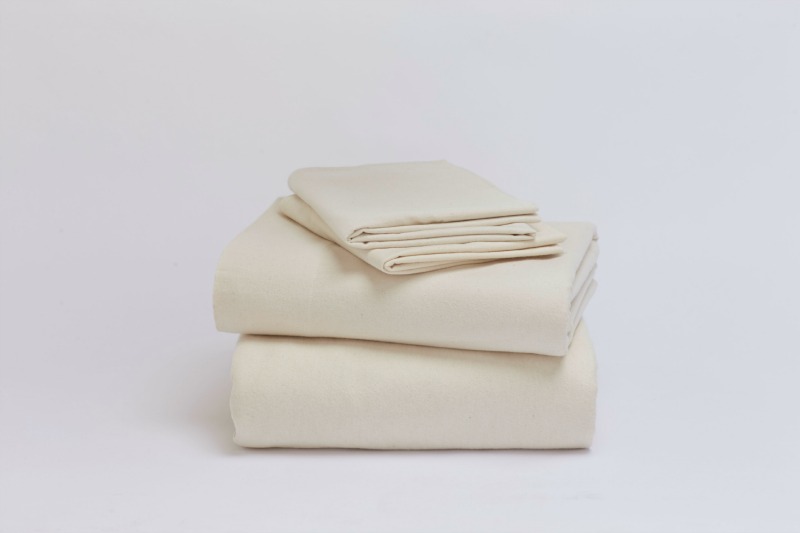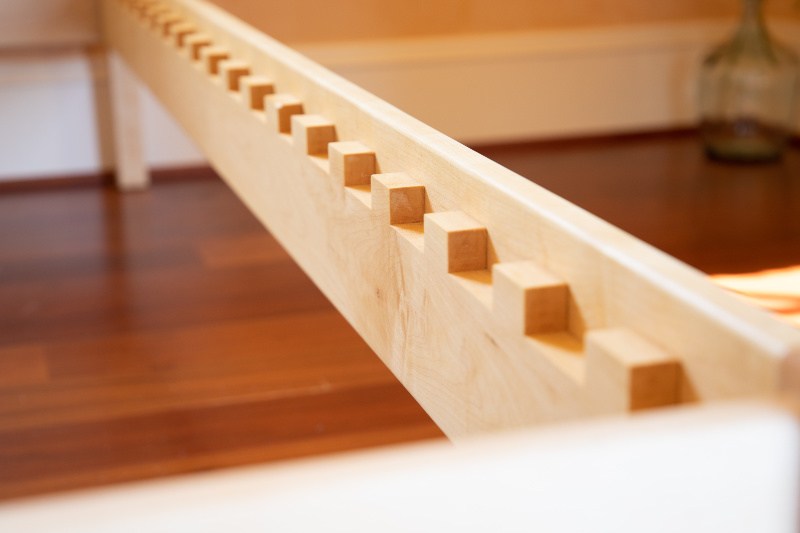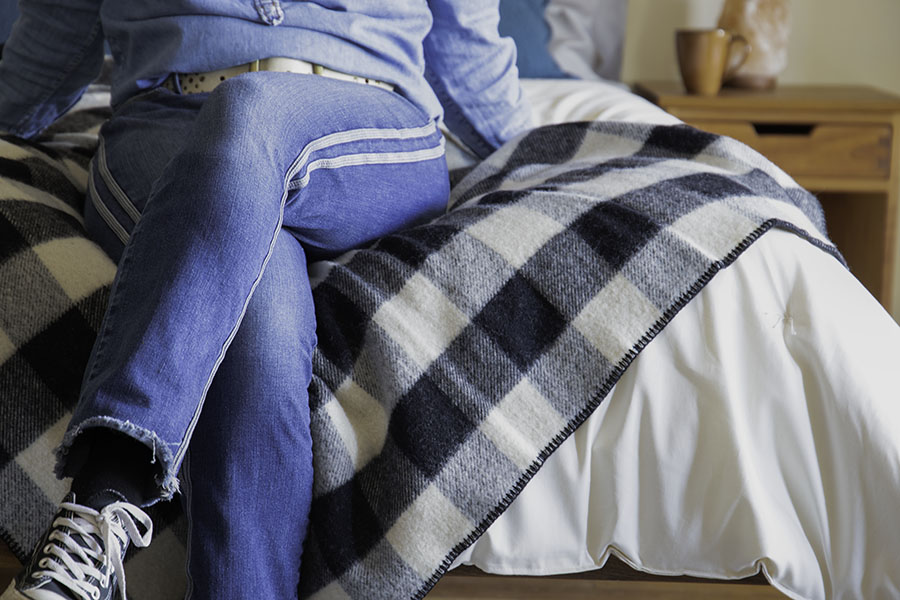Most of us relish in the thought of slipping into our bed and falling into a deep sleep. Here are some hints that can help you have a Healthy Bedroom and a truly restorative night of sleep.

Bed Sheets Should Be Natural, Breathable Fibers Made Without Toxic Treatments.
- Natural fibers allow your skin to breathe; look for cotton, hemp, or silk.
- Most 100% cotton sheets are treated with toxic formaldehyde (to reduce wrinkles).
- Exposure to formaldehyde, a carcinogen, strains your immune system.
- Flannels and sheets that are labeled “untreated” do not have this chemical.
- Also look for sheets made with un-bleached fibers or natural, low impact dyes, or better yet choose GOTS Certified organic cotton sheeting.
We stock sheets made by Coyuchi, a California company that manufactures a beautiful line of organic cotton sheeting, bath products and more. For more information, Click Here.
Choose a Supportive, Non-toxic Frame
We recommend a solid-wood frame with supportive slats instead of a box spring.
- Wooden slats provide excellent and even support. Slats are necessary to correctly support our wool mattress.
- Slats allow maximum airflow to your mattress unlike box springs that are covered in synthetic ticking.
- The metal springs in a box spring can disrupt your body’s natural electro-magnetic field.
- Look for frames with non-toxic finishes and glues.
- Check out our selection of beautiful slatted wooden frames and custom inserts.


Proper Care is Essential for a Healthy Natural Bed
Humans give off a lot of moisture day and night. Each time we exhale, moisture is released. We also perspire continually to cool ourselves and to release toxins. At night our bedding must absorb this moisture so that we can continue to sleep comfortably. Natural fibers like wool absorb the moisture, disperse it, and help it to evaporate much more efficiently than synthetics.
Proper care is important because:
- Bedding that is properly cared for will not allow moisture to build up over time.
- Excessive moisture build-up in your bedding supports mold, mildew, fungal spores and dust-mites.
- These allergens strain your immune system and disrupt your sleep.
Keeping your bedding dry with regular airing will help you to sleep more soundly and your bedding will last longer. Also using a slatted frame and occasionally placing your bedding in the sun can greatly reduce moisture build-up in your bedding.
What Makes a Good Mattress?
We spend a lot of time in bed and a mattress is an expensive, long-term investment. Each year mattress manufacturers create more confusing, technologically advanced mattresses while insomnia has become more widespread than ever. At Shepherd’s Dream LLC we believe that simple is better; we know that a bed without springs, foams, and chemicals can offer a truly restorative night of sleep –our Wool Bed is proof! A Healthy Mattress- Natural fibers – Look for mattresses that are entirely made of cotton, wool, or natural latex.
- Wool – Many natural mattresses are able to pass strict flame tests by using wool layers on the outside of the mattress. Wool is the primary fiber in all of our bedding and the only material in our All Wool Mattress. Read more about the benefits of wool bedding.
- Springs – A springy mattress provides unnatural support and metal springs can disrupt your body’s electromagnetic field.
- Foams – Synthetic foams are made of petrochemical derivatives. This allows dust-mites and allergens to build up, and off-gases toxins while you sleep.
- Chemicals – A long list of chemical solvents, glues, and fire retardants can be used in a mattress. Some of these chemicals can irritate eyes/skin/breathing, others are known carcinogens.
- Waterbeds and Airbeds – In addition to being disruptive to sleep, electric heaters and pumps create electromagnetic fields around your body that some people feel is damaging to our health. Water and Airbeds also block airflow and can cause you to overheat or get chilled while you sleep.
- Memory Foam – The toxic chemicals, flame retardants, and non-breathable surface of memory foam can cause sleepers to feel clammy and hot. Many people have strong negative reactions to the chemicals and cannot even have the mattresses in their homes.

More Elements of a Non-toxic Bedroom.
- Try to get fresh air into your bedroom. Crack your windows if you can. If the outdoor air is polluted, consider purchasing an air purifier.
- Make your bedroom cozy, but decrease excess clutter as it can be distracting and can also gather dust and allergens.
- Drapes and carpets can be additional places for dust-mites and allergens to thrive.
- Carpets, particularly if new, are also made with a long list of toxic chemicals. If you are considering a remodel of your bedroom, consider leaving out the wall-to-wall carpet and instead use hardwood floors, bamboo, cork or wool carpeting.
- Minimize electrical appliances in your bedroom.
Daytime Choices Can Affect Your sleep
- Your diet affects your ability to sleep. Try to eat healthy foods, avoiding refined sugars and late night snacks.
- Being active during the day helps your body prepare itself for sleep. Exercise can help you get a better night’s sleep, but be careful not to exercise too late in the evening.
- Drink plenty of water during the day.
- Minimize your consumption of alcohol, tobacco and caffeine.
- Avoid bringing stressful or distracting activities to bed. Work, TV, food and other pastimes may be best left out of the bedroom.
- Stress can inhibit sleep.
- Adult humans need 6-9 hours of sleep. Make sure to allow adequate time for a complete night of sleep.
- If you are having trouble sleeping, you may want to avoid taking naps or keep your daytime naps quite short

